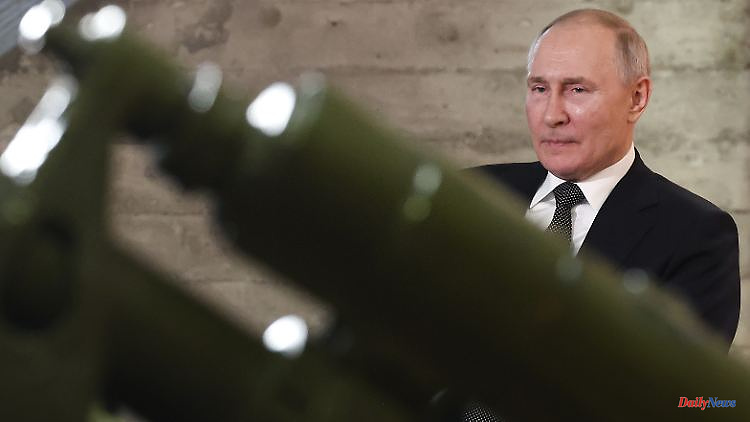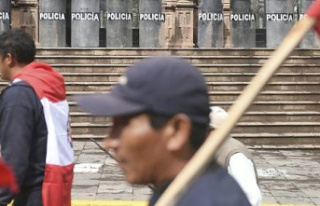For the past year, Russia has reported the second largest budget deficit in its history. If the Kremlin hadn't grabbed Gazprom's billions in profits, it would have been the biggest - a new reality for other state-owned companies as well.
Russia earned a good 250 billion euros from the sale of oil and natural gas last year - and yet Finance Minister Anton Siluanov had to report a budget deficit of 44 billion euros (2.3 percent of GDP) in January. It is the second biggest minus in Russian history.
But even Minister Siluanov assumes that the record from the first Corona year 2020 (equivalent to around 54 billion euros) could fall this year: Because in 2023 military spending is expected to increase again by 71 billion US dollars , reports the Russian business portal RBK. Expenditure on items such as "national security," which includes the police, is also expected to increase by the same amount. And for soldiers, their families, pensioners and minimum wages, ever larger sums are also due - so that the population does not rebel after all, as is assumed.
But while spending continues to rise, Russian oil prices have plummeted. US, European and other sanctions are working, says Ken Rogoff. The Harvard economist has a very clear view of where Russia is headed: He predicts that the Russian people will face "unimaginable poverty" compared to current living standards. Cuba, North Korea, Venezuela or a "huge Iran" - that is the future of Russia, he said at the World Economic Forum in Davos.
To prevent this, the Kremlin is looking for new sources of money - and seems to have found them in the National Welfare Fund and among Russian companies. The welfare fund was set up in 2008 and, like other sovereign wealth funds, invests in stocks and other assets to ensure the Russian pension system.
According to the Russian Ministry of Finance, the fund held $148 billion in January. According to Finance Minister Siluanov, around $30 billion was withdrawn last year and put into the Russian budget. It is very likely that this will happen again this year to close any gaps. However, it is unlikely that the funds from the fund will be sufficient to stabilize the budget - which is why Russian companies should also make a contribution.
In December, Russian Prime Minister Mikhail Mishustin is said to have advocated higher dividends and one-off payments from state-owned companies. The proposals were part of the so-called "sales mobilization" project, reports Bloomberg, citing Russian sources. The payouts would be huge: wherever possible, dividends of more than 50 percent of profits should be declared.
It would not be the first time that Russian President Vladimir Putin has reached into the coffers of state-owned companies to finance his campaign against Ukraine. Last year, Gazprom proudly reported record profits for 2021 and promised its investors a record dividend equivalent to around $20 billion. The 19.8 million Gazprom shareholders did not see a single cent of this money.
Because the largest owner, the Russian state, decided at the general meeting with a majority of 50.3 percent that a distribution of profits was not appropriate as long as the "special military operation" was running - and then took the entire sum as an excess profit tax the nail. Actually, the Russian budget gap was 64 billion euros last year - and thus the largest in Russian history.
This kind of self-service may be the new norm for Russian state-owned companies. Because the outlook is anything but rosy, even business portals close to the Kremlin, such as RBK, have to admit in their analyses. The Moscow media house writes that two trends will continue in 2023: expenditure will increase and income from the oil and gas business will decrease. Or to put it another way: The Kremlin can no longer help itself as much to its cash cow Gazprom as it did last time.
EU Trade Commissioner Valdis Dombrovskis has made it clear how great the financial problems of the Russian state could get. In Davos, he recalled that oil and gas prices were astronomically high last year - and yet Russia was in a recession.
That is why the future for the Russian economy looks bleak even without greedy government hands. Political scientist Alexander Libman does not primarily blame sanctions, but partial mobilization. With every wave, the shortage of personnel increases, says the Russia researcher from Freie Universität Berlin in the ntv podcast "Learned something again." But no more companies will invest either: "It doesn't make sense if you can't predict what the future will look like and you don't trust the government."
Unlike Harvard economist Rogoff, Libman does not expect "unimaginable poverty" but rather stagnation in the Russian economy. Gazprom's time as a Russian cash cow may be over - but Russian oil companies have adapted well to the sanctions, says the Berlin political scientist. Also because large countries like China, India and Brazil are not participating in the sanctions, but continue to work closely with Russia and do business.
Russian companies would adapt to this, says Libman. Western technologies and Western money cannot replace this, but it can prevent the worst from happening.
However, the Berlin political scientist is also convinced that this kind of perseverance economy will lead to gradually falling living standards in Moscow, St. Petersburg and other large cities in the medium term. "People won't notice it right away," says Libman on "Learned Again." But at some point European offers would simply be replaced by Russian ones. "You used to have 50 types of cheese, now you only have ten - and they're more expensive and taste much worse," says the political scientist. "In ten years there will still be two types of cheese left. The Russian economy is facing slow degradation."












